As York Region prepares to move into the province’s Red-Control zone on Monday while Toronto and Peel remain under stay-at-home orders for at least two more weeks, concerns are being raised about region-hopping leading to further spread of the COVID-19 variants.
Canada’s top doctor, Theresa Tam, says public health officials identified upwards of 700 cases of COVID-19 variants across Canada on Saturday – a finding she said lends new urgency to her calls to maintain personal COVID-19 precautions.
While overall daily case counts continued to trend downwards, Tam noted that the latest cases of variants of concern could fuel a bigger third wave of the pandemic.
Federal projections released Friday suggest COVID-19 variants could fuel 20,000 new cases per day by mid-March if public health restrictions are relaxed.
COVID-19 biostatistician Ryan Imgrund says governments need to look at the reproductive value – not just case counts – as it predicts where the numbers will go. Using Thunder Bay as an example, he says they are currently in the Red-Control zone but they are showing Grey-Lockdown numbers.
“We knew they would start to show Grey numbers because they’ve had a reproductive number significantly above one for three to four weeks now. And we know that when we see cases go up, we shouldn’t be surprised that all of a sudden Yellow becomes Orange and Orange becomes Red.”
When Toronto and Peel were shut down in December, and York was still open, the province saw a rise in cases as Ontarians hopped from region to region.
Ontario Health Minister Christine Elliott says they don’t want people travelling between regions at this point.
“This isn’t a reopening, everything is back to normal. Not at all,” she said. “Please stay in your own region, please follow the public health measures and sooner or later everyone will get to that place.”
Vaughan mayor Maurizio Bevilacqua stopped short of calling on visitors to stay out of the region come Monday.
“I’m not here to divide people. I think that in the GTA we share in the risk and benefits of our common citizenship,” he said. “I think what you have to do when you come to York Region, you have to respect the rules, the laws and regulations of the region and of the province.”
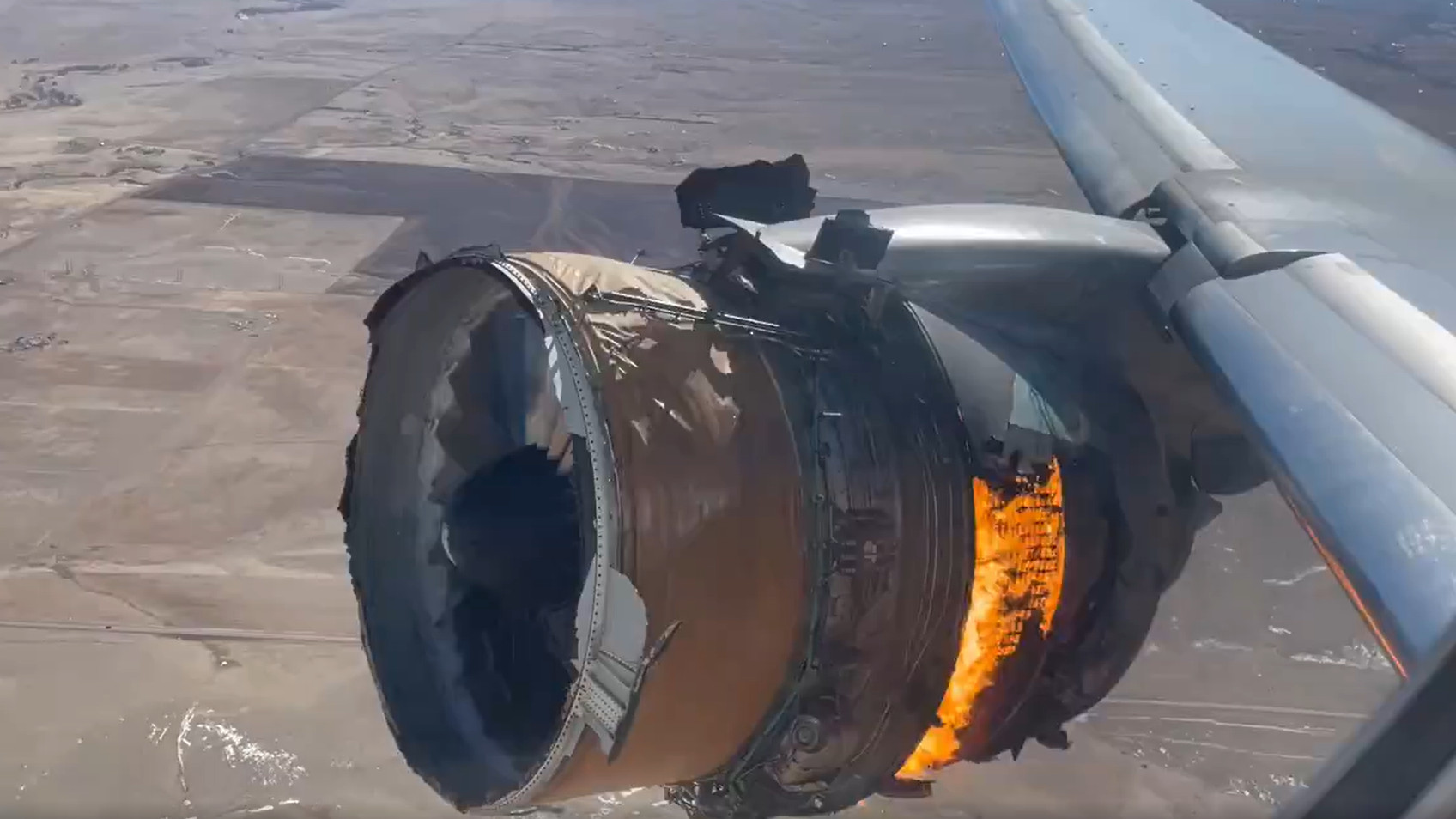
United Airlines says it is removing 24 Boeing 777 aircraft from its fleet “out of an abundance of caution” following Saturday’s incident over the skies of Denver.
The move comes after a United Airlines flight out of Denver bound for Hawaii was forced to turn back moments after takeoff when it suffered a catastrophic failure and rained pieces of the engine casing on a neighbourhood, narrowly missing a home.
There were no injuries among the 231 passengers and 10 crew on board.
“Since yesterday, we’ve been in touch with regulators at the NTSB and FAA and will continue to work closely with them to determine any additional steps that are needed to ensure these aircraft meet our rigorous safety standards and can return to service,” United said in a statement.
The airline adds a small number of customers are likely to be inconvenienced by the grounding.
The National Transportation Safety Board said in a separate statement that two of the engine’s fan blades were fractured and the remainder of the fan blades “exhibited damage.” The NTSB did caution that it was too early to draw conclusions about how the incident happened.
The U.S. Federal Aviation Administration on Sunday issued an Emergency Airworthiness Directive which will require immediate or stepped-up inspections of Boeing 777 airplanes equipped with certain Pratt & Whitney engines.
“We reviewed all available safety data following yesterday’s incident. Based on the initial information, we concluded that the inspection interval should be stepped up for the hollow fan blades that are unique to this model of engine, used soley on Boeing 777 airplanes,” read a statement from FAA Administrator Steve Dickson.
The directive does not affect Boeing 777 aircraft operated by Air Canada, who say their planes are fitted with a different engine.
Airlines in Japan and South Korea also operate planes with the Pratt & Whitney engine. Japan Airways and All Nippon Airways have decided to stop operating a combined 32 planes with that engine, according to Nikkei.
Nikkei reported that Japan’s Ministry of Land, Infrastructure, Transport and Tourism also ordered the planes out of service, and the ministry said an engine in the same PW4000 family suffered unspecified trouble on a JAL 777 flying to Haneda from Naha on Dec. 4. It ordered stricter inspections in response.
Files from The Associated Press were used in this report
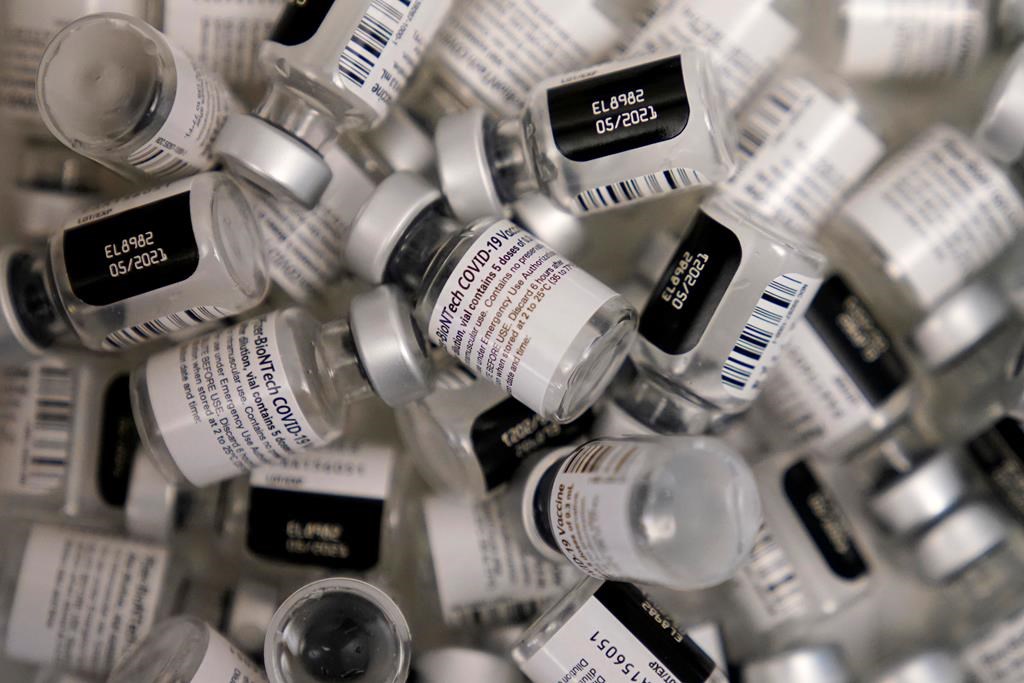
Canadians perusing social media may be coming across photos of their American peers bearing wide smiles and vaccination cards that show they’ve been inoculated against COVID-19.
A recent ramping up of the United States’s vaccine rollout has it vastly outpacing its northern neighbour, and some Canadians are wondering why distribution here is lagging so far behind.
Dr. Krutika Kuppalli, an infectious disease doctor in South Carolina, says that while the speed of the American rollout has been impressive lately, it’s not been without its faults.
Communication between states has been mostly lacking, she says, and the absence of a uniform standard for vaccine eligibility has led to inconsistencies across jurisdictions. Some states, for example, include teachers high on their priority list while others are still working on inoculating those 80 years and older.
Confusion in the early stages of the rollout caused frustration and dampened trust, she added. And while the shift to a new presidential administration last month has led to some improvements, Kuppalli says there’s room for more.
“I don’t think we’re the model of success,” she said in a phone interview. “We’ve had a lot of challenges. … but it’s getting better.
“Communication is better, there’s definitely greater transparency, and states have been very forthcoming in ramping up vaccine measures and rolling out mass vaccination sites. So all that’s helping.”
The U.S. was vaccinating an average of 1.7 million Americans per day this week, and had administered at least one dose to more than 12 per cent of its population as of Friday.
Canada, which recently dealt with weeks of shipping delays and disruptions from Pfizer-BioNTech and Moderna, has doled out nearly 1.4 million doses since its rollout began mid-December, covering about 2.65 per cent of its population with at least one dose.
Prime Minister Justin Trudeau said Friday vaccine delivery is set to rapidly increase, however, with provinces preparing to roll out almost a million and a half doses over the next three weeks.
The Americans have many factors in their favour when speeding up vaccine distribution, experts say, including a much more expansive supply than Canada’s that’s bolstered by production from U.S.-based Moderna.
While having supply is the first step, Kuppalli says getting those vaccines into pharmacies, where they can be easily administered, has also helped. The American government announced weeks ago its aim to supply vaccines to about 40,000 drugstores in the coming months.
Canada has not yet reached the pharmacy stage of its vaccine rollout, but Dr. Isaac Bogoch, an infectious disease expert with the University of Toronto, expects that to happen once we have enough supply to branch out.
“We have the exact same plan, we just need the critical mass of vaccines,” said Bogoch, who’s also on Ontario’s vaccine distribution task force. “When we get that, you’re gonna see from coast to coast vaccines offered at many different settings.”
While pharmacy distribution makes sense for a quick rollout, it also can lead to problems with wasted doses if people aren’t showing up for their appointments, says Kelly Grindrod, a professor at the University of Waterloo’s School of Pharmacy.
Pfizer-BioNTech and Moderna vaccines need to used within a relatively short timeframe after they’re thawed from ultra-cold storage temperatures, Grindrod says, and once a vial has been punctured, that interval decreases further.
She says Canada has been learning from wastage setbacks other countries are experiencing, and she expects Plan B lists to be compiled of individuals who can quickly fill in when no-shows arise.
Those lists have to be made fairly though, she cautions.
“You have to make sure there’s no queue-jumping. So it’s not your friend coming in, it’s actually people who would fall normally on the next round of priority.”
Grindrod says queue-jumping – where people with lower risk of contracting the virus or experiencing a bad COVID outcome are vaccinated before higher-priority groups – has been more culturally unacceptable in Canada than it has in the U.S., a country without a universal health-care system.
So there’s some justifiable outrage, she adds, when Canadians see American friends boasting about getting their jabs, especially if they’re not in high-risk populations.
“Equity is probably the most important principle of the Canadian vaccine rollout,” Grindrod said. “And I’m not sure that’s the case in the U.S.”
While the American rollout has had its faults, Grindrod admires some of the more unique approaches happening south of the border to ensure high-risk groups can get their doses.
She noted the recent role Black churches have played in co-ordinating inoculation drives among typically underserved neighbourhoods, and the pharmacists who have been driving vaccines into remote communities to inoculate those who can’t easily get to an immunization centre.
“You’re seeing really positive examples where communities themselves are helping to create effective outreach,” she said.
“So I think those are the real lessons we can learn from the U.S.”

The cost of the mandatory hotel quarantine won’t be quite as expensive as Prime Minister Justin Trudeau had warned.
WATCH VIDEO: https://toronto.citynews.ca/2021/02/21/returning-to-canada-under-new-quarantine-rules-brings-new-challenges/
Starting Monday, non-essential travellers flying back to Canada will have to pay to quarantine at a hotel for as many as three nights while they await COVID-19 test results. Initially, the federal government said it could run up to $2,000 per person but now it looks like it will be far less.
Nightly rates at the Alt Hotel Toronto Airport and the Sheraton Gateway Hotel at Toronto Pearson International Airport, two of the hotels currently participating in the government quarantine program, start at $339 and $319, respectively, for a single person, employees at those hotels say.
Those rates include all costs associated with the quarantine, including food and security, the employees say.
The federal government released a list of 11 approved hotels in the four cities where international flights are permitted to land.
Some Canadians abroad say the true cost of the government’s new travel rules lacks compassion.
Toronto-area resident Rohan Jumani flew to India at the beginning of the month to be with his dying father. He hopes to return to Canada in early March with his mother, who he says is financially and emotionally dependent on him. And when he lands, his pregnant wife could give birth at any time.
While the bill will be less than the $2,000 Trudeau touted, Jumani says it’s still a cost people saying goodbye to a loved one shouldn’t have to bear.
“It would be absolutely cruel for the government to slap me with a bill for returning back to Canada,” Jumani tells CityNews. “It has been very stressful for us, to be honest, because we did not budget for this.
Jumani says this is not about avoiding quarantine, adding he would be happy to do so at home for 14 days.
“Any added dollar towards quarantine is a financial burden.”
Toronto native Adam Gabay is currently in England studying physiotherapy. He says he flew back to Canada during the first wave when everyone was told to come home and while he did all he could remotely, he needed to return to England in order to get the hands-on experience necessary to complete his studies. Now, with his program ending in less than a week and his student visa set to expire, he’s also expressing frustration at the additional cost to quarantine – money on top of his current student loans.
“I’m travelling for essential reasons,” explains Gabay. “I came here for my education the same way that a lot of foreign students are allowed to come to Canada.”
WHAT YOU NEED TO KNOW ABOUT THE NEW QUARANTINE HOTELS: https://toronto.citynews.ca/2021/02/21/returning-to-canada-under-new-quarantine-rules-brings-new-challenges/
While there is a list of exemptions for non-essential travel, Gabay’s situation is not one of them while Jumani says he hasn’t heard back from officials on his plea for an exemption on compassionate grounds.
While some people who are driving back across the border may consider extending their stay outside Canada until the restriction is lifted, the president of a travel insurance agency says that also comes with some unexpected negatives.
Martin Firestone of Travel Secure Inc., warns that staying too many days outside of the country can affect your government health insurance while any extended stays in the United States could lead to someone having to file U.S. taxes.
Even those travellers trying to abide by the new rules have run into challenges, such as booking a hotel room in advance of their arrival. High call volumes have meant wait times on the phone of up to three hours for some.
Pritam Divecha said in a tweet he has tried calling on both government-provided hotline numbers for over 60 hours and has had no luck. His flight is scheduled to land on Monday.
CityNews reached out to Health Canada who said they are aware of the high volume of calls to book hotels, saying only those who are ready to reserve a room or have a flight booked should call.
Attempting to skirt the hotel quarantine rules could end up costing you a fine of $3,000. Addtional fines of up to $750,000 and six months in jail await anyone who breaks quarantine or isolation and if that results in the death of another person, they could be fined up to $1 million.
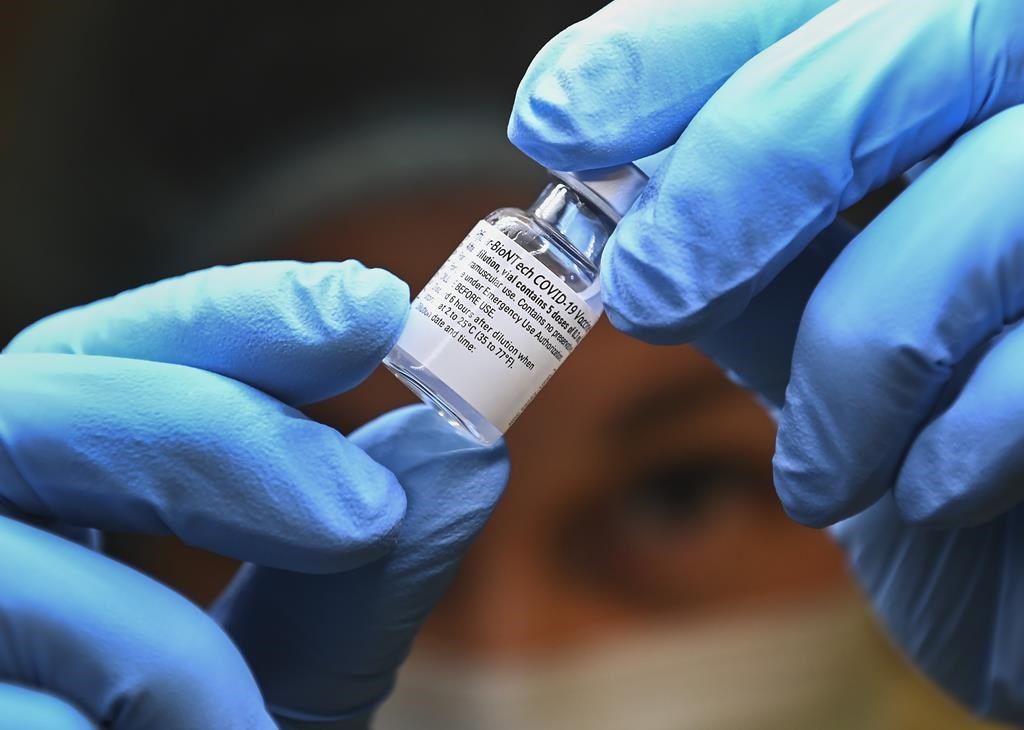
There is compelling evidence that a single dose of COVID-19 vaccines may provide almost as much protection as giving two doses, Canada’s deputy chief public health officer said Thursday.
Dr. Howard Njoo said the advisory committee of federal and provincial public health officers is having an active discussion about whether Canada would be better served to delay the second doses of vaccines in a bid to give protection to more vulnerable people quicker.
“These are what I would call early data in terms of a vaccine effectiveness or studies,” he said. “And the indications are that there’s a good level of protection after just one dose.”
Canada intends to vaccinate three million people with two doses by the end of March.
More than 990,000 Canadians have received at least one dose, and about one-third of those have also received their second doses.
Quebec’s immunization committee went as far Thursday as to recommend nobody get a second dose until a first dose is injected into everyone in six high-risk groups, including people over 70, health-care workers, and people who live in long-term care homes and retirement residences.
The committee reported that single doses have been 80 per cent effective at preventing COVID-19 so far among long-term care residents and health workers who were vaccinated.
Questions about delaying the second doses arose almost as soon as vaccinations began in December, prompting a whirlwind of debate among scientists about the ethics of “going off label.”
Pfizer-BioNTech and Moderna’s vaccines – the two currently authorized in Canada – were tested by giving two doses, 21 days and 28 days apart respectively.
But Dr. Danuta Skowronski, the epidemiology lead for influenza and emerging respiratory pathogens at the British Columbia Centre for Disease Control, said data show two weeks after one dose of either vaccine, the protection against COVID-19 was almost as good as what was found after two doses.
Skowronski and Dr. Dr. Gaston De Serres from the Institut national de sante publique du Quebec made the case in a letter published in the New England Journal of Medicine this week.
Moderna reported itself that two weeks after one dose, those who got the vaccine were 92 per cent less likely to develop COVID-19 symptoms.
Pfizer and BioNTech, whose vaccine uses similar genetic technology to Moderna’s, said their vaccine was 52 per cent effective after one dose, but 94.5 per cent effective after two.
Skowronski said Pfizer started measuring illness as soon as the injections were given, which she said is “unreasonable.”
“It’s basic vaccinology that you don’t expect the vaccine to activate the immune system instantaneously,” she said, in an interview with The Canadian Press.
Skowronski said if you wait two weeks to start counting infections, there were 92 per cent fewer infections of COVID-19 among those who got one dose of the vaccine, compared with those who got the placebo.
At that level of protection, she said “we need to get a first dose into our priority populations, and the most vulnerable of those at greatest risk of severe outcomes and the precious resource of our front-line health-care workers.”
She said the second dose should eventually be given but said there isn’t a maximum time she would put on how long to wait.
Pfizer has issued caution about adjusting the dosing schedule but said the decision to do so rests with local authorities.
“We at Pfizer believe that it is critical for health authorities to carry on surveillance on implemented alternative dosing schedules to ensure that vaccines provide the maximum possible protection,” the company’s statement reads.
Canada’s National Advisory Committee on Immunization said in January that the recommended schedule should be followed wherever possible but that delaying a second dose up to six weeks could be beneficial, particularly with a shortage of supplies and a fast-spreading virus.
Skowronski said waiting six weeks instead of three or four for a second dose won’t do much.
“That’s not maximizing coverage that we need to undertake with the scarcity of the vaccine that is available now.”
Several provinces have been delaying the second doses a couple of weeks, particularly as deliveries of both Pfizer-BioNTech’s vaccine and Moderna’s slowed to a crawl in mid-January.
Those delays appear to be over. Pfizer says it will ship nearly three million doses over the next six weeks, and Moderna promises to ship more than 1.4 million.
With the two authorized vaccines, and the two-dose schedule followed, Canada expects to vaccinate 14.5 million people by the end of June and all Canadians who want to be immunized by the end of September.
A new vaccination schedule issued Thursday shows if the other three vaccines currently being reviewed get approved by Health Canada, 24.5 million Canadians could be vaccinated before Canada Day.

A NASA rover streaked through the orange Martian sky and landed on the planet Thursday, accomplishing the riskiest step yet in an epic quest to bring back rocks that could answer whether life ever existed on Mars.
Ground controllers at the space agency’s Jet Propulsion Laboratory in Pasadena, California, leaped to their feet, thrust their arms in the air and cheered in both triumph and relief on receiving confirmation that the six-wheeled Perseverance had touched down on the red planet, long a deathtrap for incoming spacecraft.
It took a tension-filled 11 1/2 minutes for the signal to reach Earth.
“Touchdown confirmed! Perseverance safely on the surface of Mars, ready to begin seeking signs of past life,” flight controller Swati Mohan announced to back-slapping, fist-bumping colleagues wearing masks against the coronavirus.
The landing marks the third visit to Mars in just over a week. Two spacecraft from the United Arab Emirates and China swung into orbit around Mars on successive days last week. All three missions lifted off in July to take advantage of the close alignment of Earth and Mars, journeying some 300 million miles in nearly seven months.
Perseverance, the biggest, most advanced rover ever sent by NASA, became the ninth spacecraft since the 1970s to successfully land on Mars, every one of them from the U.S.
The car-size, plutonium-powered vehicle arrived at Jezero Crater, hitting NASA’s smallest and trickiest target yet: a 5-by-4-mile strip on an ancient river delta full of pits, cliffs and fields of rock. Scientists believe that if life ever flourished on Mars, it would have happened 3 billion to 4 billion years ago, when water still flowed on the planet.
Over the next two years, Percy, as it is nicknamed, will use its 7-foot (2-meter) arm to drill down and collect rock samples with possible signs of bygone microscopic life. Three to four dozen chalk-size samples will be sealed in tubes and set aside on Mars to be retrieved by a fetch rover and brought homeward by another rocket ship. The goal is to get them back to Earth as early as 2031.
Scientists hope to answer one of the central questions of theology, philosophy and space exploration.
“Are we alone in this sort of vast cosmic desert, just flying through space, or is life much more common? Does it just emerge whenever and wherever the conditions are ripe?” said deputy project scientist Ken Williford. “We’re really on the verge of being able to potentially answer these enormous questions.”
China’s spacecraft includes a smaller rover that also will be seeking evidence of life – if it makes it safely down from orbit in May or June.
Two older NASA landers are still humming along on Mars: 2012’s Curiosity rover and 2018’s InSight.
Perseverance was on its own during its descent, a manoeuvr often described by NASA as “seven minutes of terror.”
Flight controllers waited helplessly as the preprogrammed spacecraft hit the thin Martian atmosphere at 12,100 mph (19,500 kph), or 16 times the speed of sound, slowing as it plummeted. It released its 70-foot (21-meter) parachute and then used a rocket-steered platform known as a sky crane to lower the rover the final 60 or so feet (18 metres) to the surface.
Perseverance promptly sent back two grainy, black-and-white photos of Mars’ pockmarked, pimply-looking surface, the rover’s shadow visible in the frame of one picture. The rover appeared to have touched down about 35 yards from the nearest rocks.
“Take that, Jezero!” a controller called out.
Mars has proved a treacherous place. In the span of less than three months in 1999, a U.S. spacecraft was destroyed upon entering orbit because engineers had mixed up metric and English units, and an American lander crashed on Mars after its engines cut out prematurely.
In addition to mining the rocks, Perseverance will conduct an experiment in which it will convert small amounts of the mostly carbon dioxide atmosphere into oxygen, a process that could be a boon to future astronauts by providing breathable air and an ingredient for rocket fuel.
The rover is also equipped with a record 25 cameras and two microphones, many of them turned on during descent. Among the never-before-seen views NASA intends to send back in the next couple days: the enormous supersonic parachute billowing open and the ground getting closer.
“A feast for the eyes and ears. It’s really going to be spectacular,” observed Arizona State University’s Jim Bell, lead scientist for a pair of mast cameras that will serve as the rover’s eyes.
NASA is teaming up with the European Space Agency to bring the rocks home. Perseverance’s mission alone costs nearly $3 billion.
The only way to confirm – or rule out – signs of past life is to analyze the samples in the world’s best labs. Instruments small enough to be sent to Mars wouldn’t have the necessary precision.
“It’s really the most extraordinary, mind-boggingly complicated and will-be history-making exploration campaign,” David Parker, the European Space Agency’s director of human and robotic exploration, said on the eve of landing.
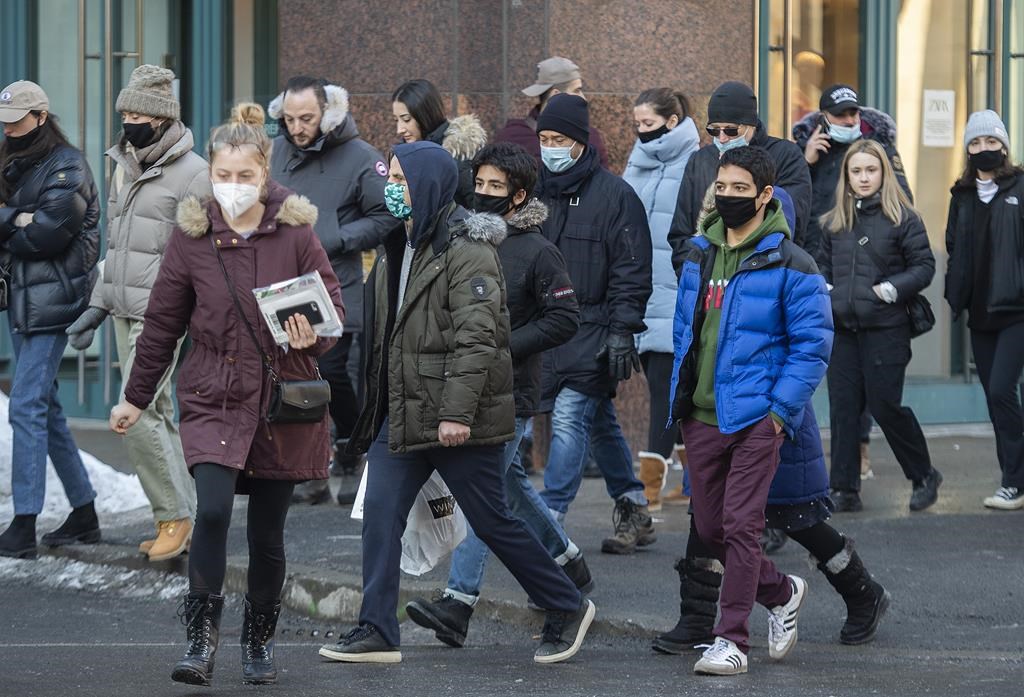
Toronto Public Health says they have identified 57 COVID-19 variants in the city but stress the discovery of new variants is “the tip of an iceberg.”
Officials say as of February 17, 56 of the variants are of the UK strain (B.1.1.7) and one confirmed case of the Brazilian variant (B.1). There are currently no confirmed cases in the city yet of the South African variant, also known as B.1.351.
However, Public Health Ontario is currently conducting whole genome sequencing on 341 other cases that have screened positive for a mutation.
Toronto public health officials say in a statement that while current case counts “do not seem bad,” the number of variant cases increased by 20 in just the last week alone.
“While there has been a downward trend in many of the key indicators, I am highly concerned about where the pandemic is headed,” said Toronto’s Medical Officer of Health, Dr. Eileen de Villa. “We are in a precarious situation and face exponential growth, due to the increased transmissibility of the variants.”
Data posted by TPH shows the majority of variants are mostly spreading among people aged 20-39 and that almost 31 per cent can be attributed to community spread while 27 per cent is due to household contact. Only 11 per cent due to travel.
Toronto officials point out that Germany saw its proportion of UK variant cases increase by 22 per cent in two weeks while closer to home, Newfoundland and Labrador has had almost 300 cases linked to the UK variant after confirming just over 700 total COVID-19 cases since the pandemic began.
The Ontario government is set to reveal on Friday whether or not Toronto and Peel Region will re-open, joining the majority of the rest of the province. Dr. de Villa, along with her counterpart in Peel, have advocated against re-opening for at least two more weeks.
Mayor John Tory says it’s important that the lockdown we’re currently in “is the last one”.
“Our public health officials have been clear about the risk of a third wave,” said Tory. “The worst mistake we could make right now is to ignore the advice of our medical experts and to begin to re-open too quickly. We absolutely do not want to find ourselves opening things up, even slightly and then having to close down again a few weeks from now.”
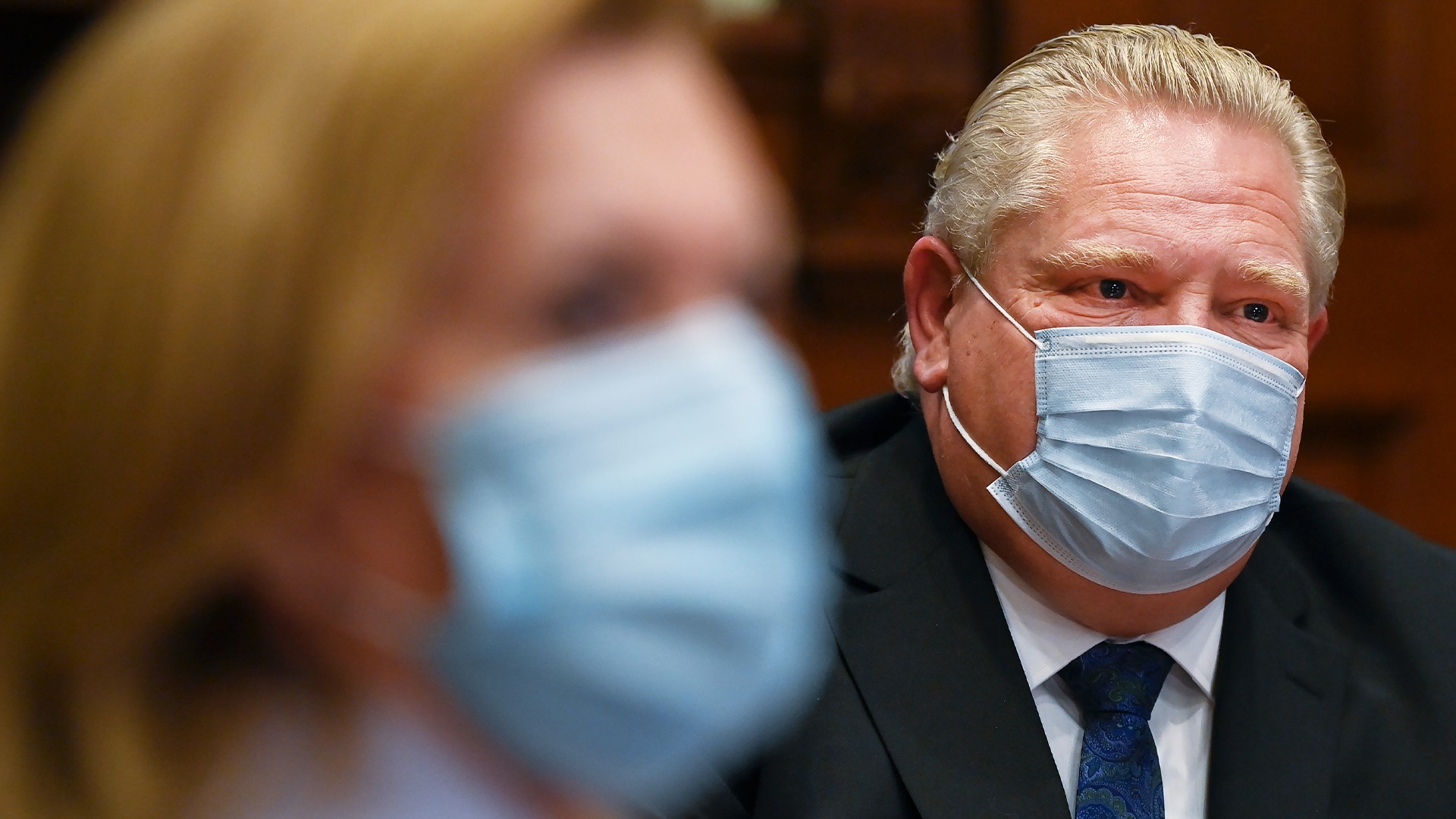
Premier Doug Ford suggested Thursday that his government would grant a request from Toronto and Peel Region to remain under a stay-at-home order for two more weeks.
WATCH VIDEO: https://toronto.citynews.ca/2021/02/18/toronto-peel-reopening-decision/
The two COVID-19 hot spots are set to have their strict pandemic restrictions loosened on Monday but have asked for a delay, saying easing measures next week could lead to more illness and death.
A decision on those two regions, as well as York Region and North Bay, which also remain under a stay-home order, is expected Friday.
Ford said Thursday that he’s “always supported local medical officers of health.”
“No one understands their area, in Peel and Toronto, more than their local medical officers of health,” he said. “I’m sure we’re gonna follow the advice of the doctors.”
During question period at Queen’s Park, Christine Elliott said “there is a new load of data coming in tonight that is going to determine the recommendation that Dr. Williams will be making to the government with respect to the situation in both Peel and Toronto”
Elliott also reiterated government talking points, saying it is not a reopening per se, but a “transition” to the new reopening framework.
She also said the government can pull the trigger on an emergency break to put areas back into lockdown, though its not clear what the criteria are to use that option.
On Wednesday, Toronto’s Medical Officer of Health Dr. Eileen de Villa called for the city’s stay-at-home measures to be extended for at least another two weeks, citing concerns that the COVID-19 variants of concern could lead to “exponential spread” in the region.
Dr. de Villa along with the Medical Officer of Health for Peel Region, Dr. Lawrence Loh, officially made the request to delay loosening restrictions in their regions in a letter to Dr. David Williams, Ontario’s chief medical officer.
During the city’s COVID-19 update that day, Dr. de Villa said she has “never been more worried about the future than I am today.”
Ford said the province was also concerned about variants.
“We have to keep our guard up constantly,” he said.
Meanwhile, Dr. David Williams, the province’s chief medical officer, said he needed to review more data before making a recommendation on Toronto and Peel to the government.
“It’s not just a rigid number that flips the switch,” he said. “It’s a combination of qualitative and quantitative information that feeds into it. That gives us the best advice when we give that up to the ministers and cabinet.”
Williams added that while the province’s cases continue to trend downward, Ontario remains in a “precarious” place because of the variant strains.
York Region’s medical officer of health, however, has said his community is ready to see an easing of the strictest measures.
Dr. Karim Kurji said Thursday that he has recommended York be placed in the red – or second-strictest – category of the province’s tiered restrictions system. Under that category, people can access fitness facilities and dine indoors at restaurants, with limits on capacity.
Kurji said his public health unit is concerned about the mental health and economic impacts of the lockdown. He added that public health authorities are still asking people to say home except for essential trips.
The new variants of COVID-19 – of which York Region has detected 258 cases – are concerning, but an aggressive vaccine strategy and other measures will help keep cases low, he said.
“With enhanced restrictions in the Red-Control Zone, along with our strategies for aggressive case and contact investigation and enforcement, we can keep this in check,” Kurji said in a statement.
“We are hopeful for the future.”
Markham mayor Frank Scarpitti endorsed the recommendations put forth by Dr. Kurji and asked for additional restrictions. Among them, no indoor social gatherings outside of members of the same immediate household; reducing capacity limits in grocery stories from 75- to 50 per cent whiel big box retailers and malls be restricted to 25 per cent capacity; personal service and small business restricted to 50 per cent capacity; and large sporting and recreational facilities remaining closed.
“York Region is seeing a flattening of cases, including the variants,” said Scarpitti. “Although the variants pose a risk, Dr. Kurji believes that currently the Region is keeping the variants in-check and under heavy surveillance. York Region has aggressive and close contact management of the variants.”
Scarpitti said even though the region will be partially reopened next week, he asked residents to continue staying at home whenever possible and going out only for essential trips.
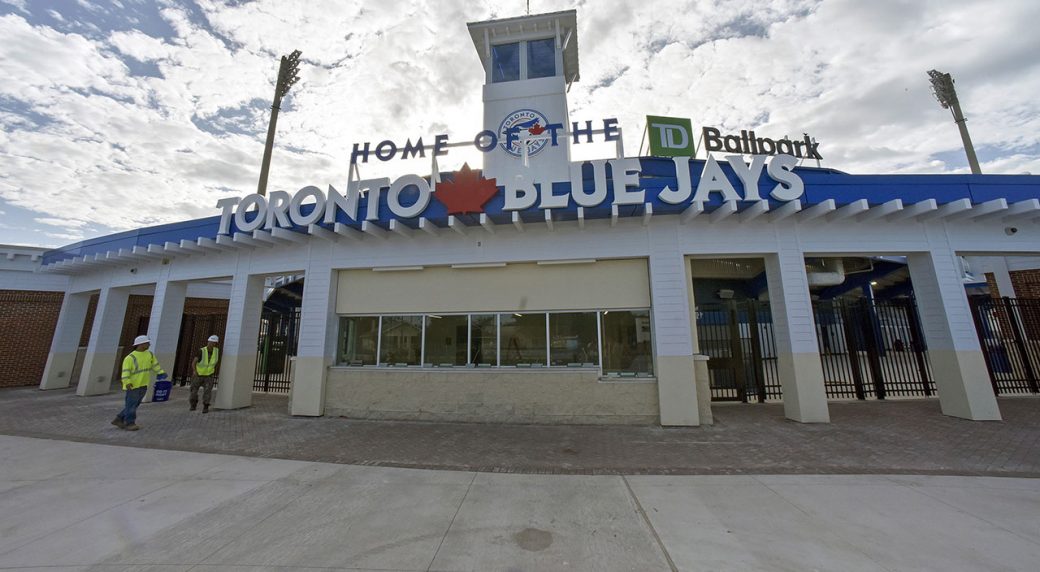
The Toronto Blue Jays, displaced once again by pandemic border restrictions, will open the 2021 season at their spring home in Dunedin, Fla., according to multiple industry sources.
An internal email Wednesday informed staffers of the decision, which is expected to be announced Thursday, when the club holds its first official workout for pitchers and catchers of the spring.
For now, the shift to TD Ballpark covers homestands April 8-14 against the Los Angeles Angels and New York Yankees and April 27-May 2 versus the Washington Nationals and Atlanta. Similar to the NBA’s Toronto Raptors, who are playing out of nearby Tampa, the Blue Jays will wait to determine the status of the May 14-24 series with Philadelphia, Boston and Tampa Bay and beyond, in the hopes the border opens up and allow for a return to Rogers Centre in Toronto.
It remains unlikely they would gain approval to play May games in Toronto. A return home in the second half may be more realistic, after players and large segments of the population in the U.S. and Canada are vaccinated.
Toronto last played at 49,000-capacity Rogers Centre on Sept. 29, 2019, an 8-3 win over Tampa Bay.
Settling on a temporary home, at least for the early portion of the schedule, allows the Blue Jays to avoid the type of chaotic scramble that preceded the decision to spend the pandemic-shortened 2020 campaign at Buffalo’s Sahlen Field.
The Blue Jays went 17-9 at the home of their triple-A affiliate after an extensive remodelling of the facility to accommodate the COVID-19 health and safety protocols, as well as the day-to-day needs of two major-league teams.
The changes at Sahlen Field included renovations to locker-rooms, dining rooms, bathrooms and weight rooms, including a temporary new visitors’ clubhouse down the right field line. Lighting upgrades were also necessary to ensure visibility for players and maximize broadcast quality.
Those changes were implemented in about two weeks after hearing that they would not obtain the necessary governmental permissions to play in Canada, and attempts to play in Pittsburgh and Baltimore were shot down.
The Blue Jays had initially planned to remain at TD Ballpark last year, investing $600,000 to bring the lights up to major-league standards and make other upgrades, but looked elsewhere amid a surge of coronavirus infections in the state.
Last week, the team announced it will sell tickets up to 15 per cent of capacity for Grapefruit League home games. Additional protocols for those attending included tickets sold in pods of two or four seats, face coverings for entry, symptom screening and hand sanitizing stations.
It wasn’t immediately clear if they intend to sell tickets for the regular-season games, but they will already have a framework in place should they chose to.
The border remains closed to nonessential travellers who are not Canadian citizens; Canada requires those entering the country to isolate for 14 days. And starting Monday, air travellers who arrive in Canada will be forced to quarantine in a hotel for up to three nights as they await the result of a coronavirus test.
Ongoing challenges with the pandemic and how that affects the process of crossing the border between the U.S. and Canada will also keep the Toronto Raptors in their adopted Tampa, Florida, home for the remainder of the regular season, the NBA team said last week.
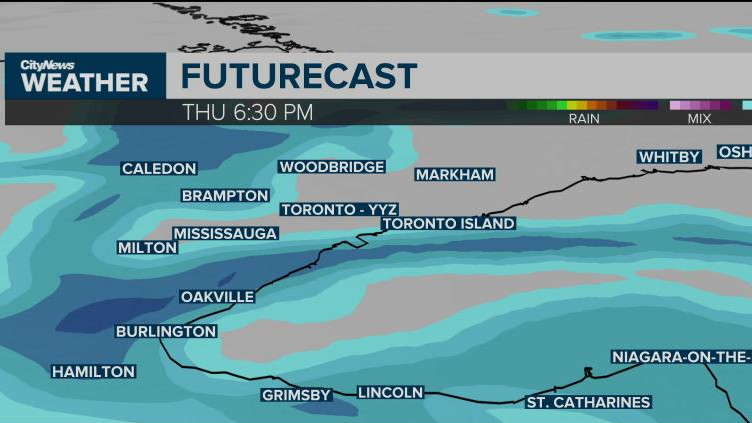
Environment Canada has issued a Snow Squall Watch for Toronto and parts of the GTA ahead of a second round of snow.
Toronto, Peel, and Halton regions are under the watch, which is calling for snow squalls to develop over the west end of Lake Ontario Thursday morning and last through the night.
“These snow squalls have the potential to produce 15 cm in 12 hours,” said the national weather service. “Current indications suggest that the snow squalls could affect shoreline areas from Toronto Island to Burlington as well as areas inland.”
“Motorists should be prepared for possible winter driving conditions, especially along the QEW and portions of highway 403 and 407 on Thursday.”
Most of the Golden Horseshoe is expected to see anywhere from 5-to-10 cm, but localized totals of 10-to-20 cm are possible between Burlington and Mississauga.
The snow should taper off by Friday morning.
This comes on the heels of a winter storm that hit the GTA and much of Southern Ontario Monday evening into Tuesday morning.









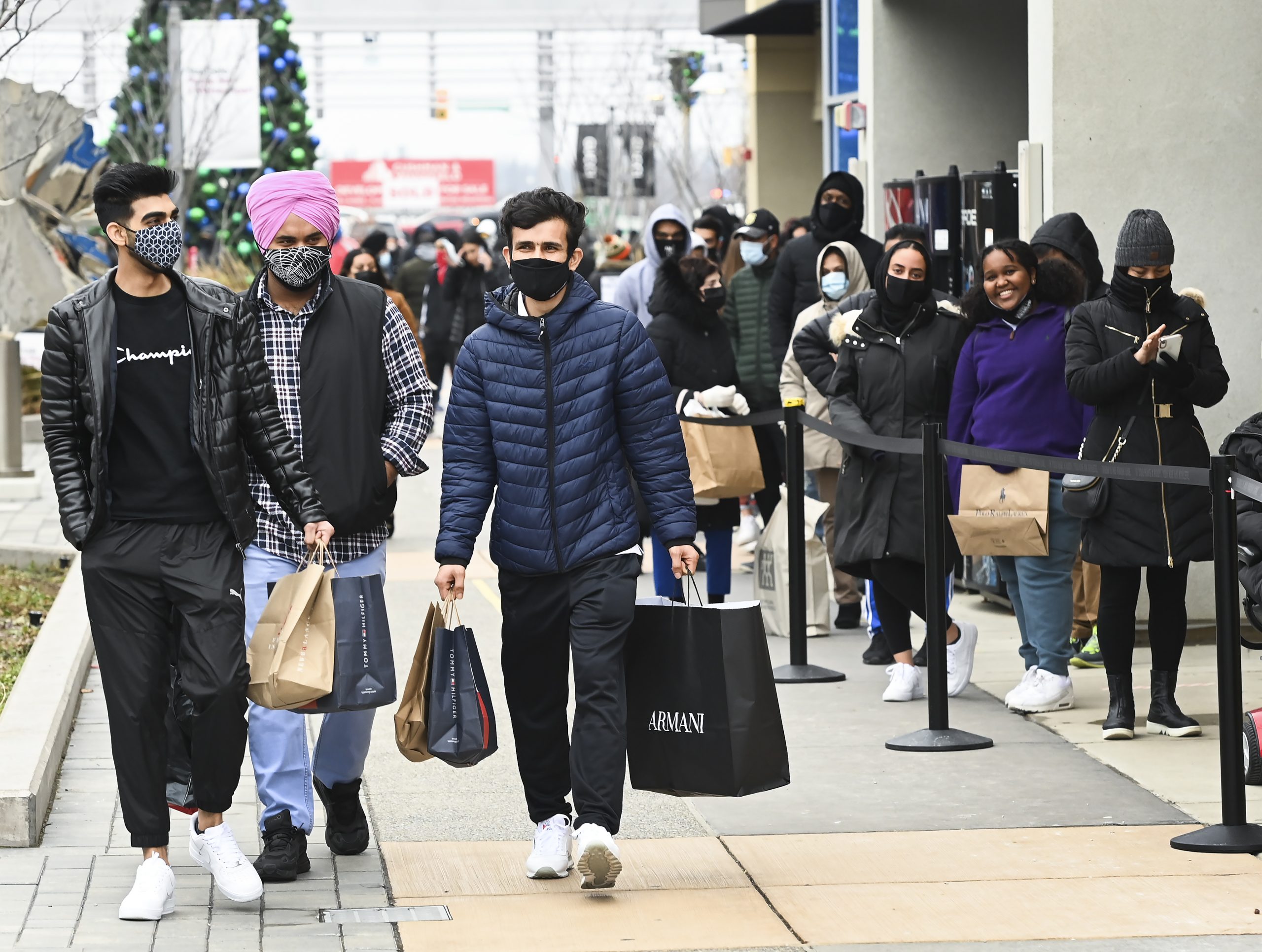

 (@FAANews)
(@FAANews) 






